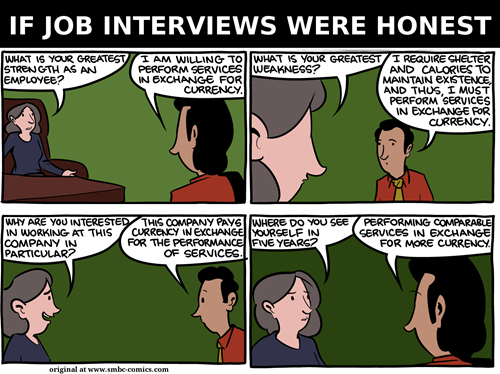As per usual, I have taken the opportunity to over-analyze; in this case, it's the choice of interview day couture.
1) No matter what, unless you commit a major fashion felony, you're OK. I mean, nobody is going to care about our interview fashion choices as much as you do.
I imagine that companies doing plenty of hiring have a steady stream of candidates coming through their doors. And at the end of the day, they want to hire you for what's inside your head, not what's on your body. So just realize that you care more about what you wear than your interviewers do. As long as you don't wear anything completely nuts, they won't even remember what you were wearing the next day.
2) Dressing for comfort is a requirement.
This one is a non-negotiable, folks. You are not going to do well in an interview if you aren't comfortable. Tight waistband, itchy fabric, shoes that are squeezing the bajezus out of your feet. Yeah, those should never happen. This is why I recommend doing dry run with your outfit of choice well ahead of time (but not so far ahead of time that might result in clothes fitting differently). Even you dudes. Whatever you do, give yourself enough time to go shopping and have something altered if you absolutely need to. Then put on your outfit and stand up and sit down. Cross your legs, lean back. Still OK? Good.
Also, think through what your day might be like. Are you interviewing with a company that has a "campus" like Amazon or Microsoft? You might be walking so comfortable footwear is key. Is the company super casual? Is it even possible that a bean bag will be sat in at some point? Maybe a suit would feel a little weird in that situation.
3) When in doubt, dress a little better than you think your interviewers will.
This is always my go-to rule for deciding what exactly to wear. I take what I know about the typical attire at the company and I step it up. Heck, go stalk their building(s) to see what people have on. Then dress just a little bit better. Not flashy better, just more buttoned up. Wear something that puts you in an interviewing state-of-mind.
So, if you are a developer and your colleagues might be wearing this:
(Photo credit: The Muse, Decoded company profile)
Then maybe you think about wearing this:
Let's do it again. Them:
You:
(from MaleStandard.com)
Ladies, them:
(Source: TheMuse.com, Mutual Mobile profile)
You:
(Source: hello gorgeous)
I've heard other recruiters tell candidates to dress just like the rest of the folks that work at the company so you "fit in" and I get what they are saying but the thing is that the people who you are trying to make a good impression on already know you don't have the job yet. As a recruiter, what I wanted to see was someone who was taking the interviews seriously, that they made an effort. I don't want to see a suit, I want to see polish and effort. And please...
- No flashy jewelry or makeup
- Wear deodorant and no bed head (check your look from the back, yo)
- No heavy cologne or perfume
- No ripped or distressed anything
- No t-shirts
- Athletic shoes of the fashion variety only (if you must) and they have to be impeccably clean
- Do your ironing the night before and have a back-up
I'll let you know if I get any other perspectives of advice from recruiters on this.















